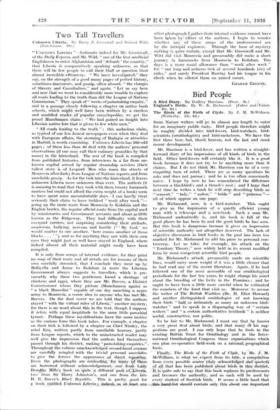Two Tall Travellers
Unknown Liberia. By Harry J. Creenwall and Roland Wild. (Hutchinson. 18s.) " UNKNOWN LIBERIA "—fortunate indeed for Mr. Greenwall, of the Daily Express, and Mr. Wild, " one of the first unofficial Englishmen to enter Afghanistan and ' debunk ' the country,", that Liberia is comparatively speaking unknown, so that there will be few people to call their bluff or question their althost incredible effrontery. " We haVe investigated," they say, on the strength of a good many pages of potted history, sometimes inaccurate, and gossip, often absurd, " the charges of Slavery and Cannibalism," and again, " Let us say here and now that we went to considerably more trouble to explore ay'reads leading to the truth than did the League of Nations Commission." -They speak of " weeks of painstaking enquiry," and in a passage closely following achapter, MI native bush schools, which might well have been written by a careless and muddled reader. of popular encyclopedias, we get the proud Mmichatisen 'claim "We had-gained- an insight 'into Liberian native lore-that is given to few white men."-
" All roads leading to the truth " : this audaciOus
so typical °Your leis honest newspapers even when they deal with European affaira, the storming of Badaiiii or atrocities in Madrid, is worth. examining. Unknown Liberia has 260 odd pages_; of these less _than 40 deal with the authors' personal observations (if one may call their culinary grumbles by that name) in the hinterland. The rest of the book is coMpiled from published histories, from interviews in a far from un- known capital served by regular steamship services (their tallest story is of Leopard Men who roam the streets of Monrovia after dark), from League of Nations reports and from unreliable gossip. • As'for the trek into the hinterland, it leaves unknown Liberia more unknown than ever. The authors (it is amusing to read that they took with them twenty hammock earners could not :affordthe extra weight of a book), seem to have spent some uncomfortable days—I can hardly treat Seriously their claim to have trekked "week after week "- going up the main' route from Monrovia to KOlithirn and the English border, the regular official route from the capital used by missionaries and Government servants and about as little known as the Ridgeway. They had difficulty with their overpaid carriers,- not surprising considering their attitude, suspicious, bullying, nervous and hostile (" ' My God,' we would mutter to one another, ' here comes another of those blacks . . . ' "), and as for anything they saw with their own eyes they might just as well have stayed in England, where indeed almost all their material might easily have been compiled.
It is only from scraps of internal evidence, for they print no map of their route and all details are for reasons of their own carefully shrouded, that I conclude they went up by Belliyella and Jenne to Kolahun (a route the Liberian Government always suggests to travellers, which is pre- sumably why these two gentlemen found a shortage Of chickens and eggs), where they saw Mr. Reeves, a District Commissioner whom they picture (Munchausen again) as " a black Mussolini " capable of one day marching a negro army to Monrovia, a comic idea to anyone who has met Mr. Reeves. On the dust cover we are told that the authors stayed " with the virtual ruler of Liberia," another mystery, for there is no word about this in the text, though I suppose it refers with equal ineptitude to the same little parochial tyrant. Perhaps these mystification have the same motive as the curious form this book takes. For example, a chapter on their trek is followed by a chapter on Chief Nimley, the rebel Kru, written partly from unreliable hearsay, partly from League reports, which to the uninstructed reader may well give the impression that the authors had themselves passed through his district, making "painstaking enquiries." Throughout. the volume unacknowledged second-hand sources are careffilly mingled 'with the trivial personal aneedOies to give the former the appearance ,of direct reptriOrig. psn the photOgraphs arc-- inisleadirtg,' for many Of :them are borrowed without' acknowledgement, from Lady DorOhy 11illls'A on ;finite ..12. different Of,,-Libexiit, two from Sir Harry -Johnston's, and one from the late II. R. Reeve's Black Republic. This is pretty good for P;IF2P1-c14,Aitrifif.i.-.AcIcetl_f_;446.:44,itekst--Qtke: • other photograph I gather frofttiaternal evidence cannot have been taken by either of the authors, I begin to wonder whether -any of these Snaps. of the undiscovered are by the intrepid explorers. Through the haze of mystery nothing is ,quite. certain, except that :Green:viral and Mr. Wild did visit Monrovia and presumably did make a short journey in hammocks from Monrovia to Kolahun. Ten days is a more usual allowance than " Week after week " for " our long and arduous trek of several hundreds (sic) of miles," and surely President Barclay had his tongue in his cheek when he offered them an armed escort.
GRAHAM GREENE.












































 Previous page
Previous page